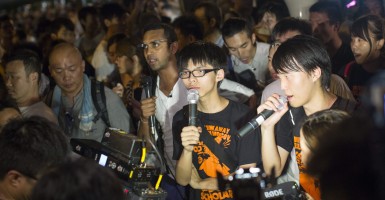No matter how adventurous your teenage years were, chances are you had nothing on Joshua Wong.
Labeled “a threat” an “extremist” and “an infiltrate” by authorities in Beijing, the 17-year-old was arrested, assaulted and released last month for his role in leading the demonstrations underway in Hong Kong.
It’s easy to shrug off the images of another protest on the nightly news, but it’s important to understand what sparked the uprising in this nation off the Chinese mainland; namely, a desire for freedom.
Why now? Because the people who live there want the People’s Republic of China to honor the promises made to permit them to elect their own leaders.
Following its return to the mainland from the British in 1997, the idea was to allow Hong Kong to continue to enjoy its world-class track record for prosperity and economic freedom by setting up “one country, two systems.” That meant Beijing agreeing to preserve the institutions that led to Hong Kong’s success in the first place.
We’re talking about things that most Americans take for granted: free-market capitalism, a free press, an independent judiciary and civil liberties.
But then, earlier this year, Beijing issued a paper that undermined the “Basic Law” that details this agreement. Beijing asserted “comprehensive jurisdiction” over Hong Kong, and thereby, most assumed, control over the slate of candidates that Hong Kong citizens could choose from in their next elections in 2017. At the end of August, Beijing explicitly confirmed this suspicion that free elections would be free in name only.
The people of Hong Kong responded with student walkouts and protests. Authorities answered them with tear gas, pepper spray and police mobilization.
Now we have a standoff. On the one hand, as Heritage Foundation Research Fellow Dean Cheng has noted, Chinese President and Communist Party General Secretary Xi Jinping is in the midst of a power transition and, therefore, has no desire to give in and appear weak. On the other hand, Hong Kong — one of the world’s major financial centers — remains a central gateway for investment into China.
Beijing doesn’t want to lose face. It also doesn’t want to jeopardize this flow of capital. And hopefully, it doesn’t want another Tiananmen Square massacre.
The key question for us as Americans, I think, is whether we’ll take the right lesson from all this, and recognize just how fortunate we really are.
I couldn’t help but think about that as I read what historian Lee Edwards had to say about the demonstrations. He recalled his first visit to Hong Kong in 1969, when he was interviewing Chinese men and women who had swum across Hong Kong Bay, braving both sharks and Chinese Communist gunboats, to reach the British colony of Hong Kong.
His question for each one: “Why did you risk your life to come to Hong Kong?” He expected most would point to some material gain, but every one of them said the same thing: “I wanted to be free.”
Added Mr. Edwards: “They wanted to live where they wanted, to work at what they wanted, to say what they wanted, to read what they wanted, to rise as fast and as far in life as their ability and ambition could take them. They wished to be free of the oppressive Chinese Communist government that sought to rule their lives from cradle to grave.”
If we take nothing else from the demonstrations occurring today, let’s at least foster a renewed appreciate for the freedoms we enjoy every day of our lives.
“What we obtain too cheap, we esteem too lightly,” Thomas Paine once wrote. “It is dearness only that gives everything its value.” May we never forget how valuable our freedoms are — and how dear a price others have paid so that we may enjoy them.
Originally appeared in the Washington Times.

























